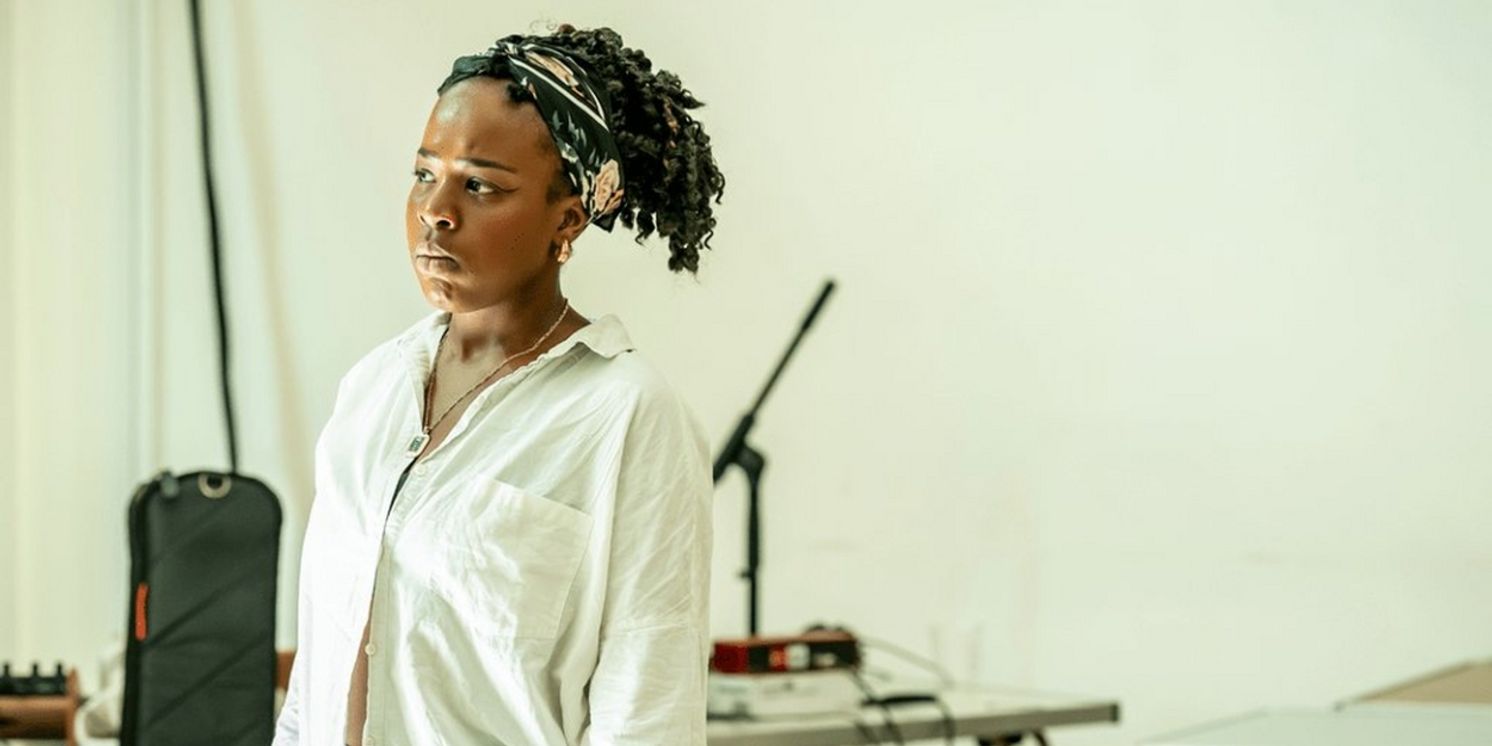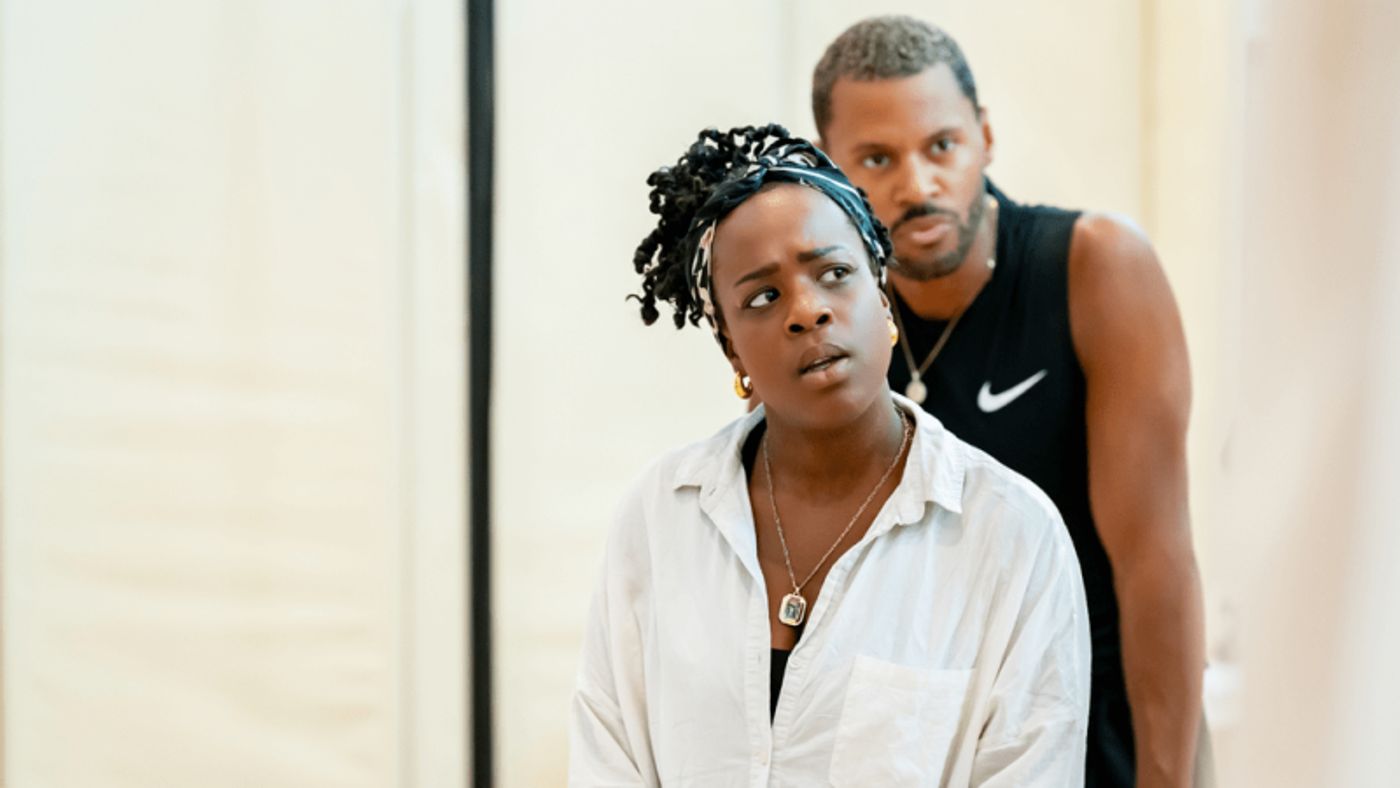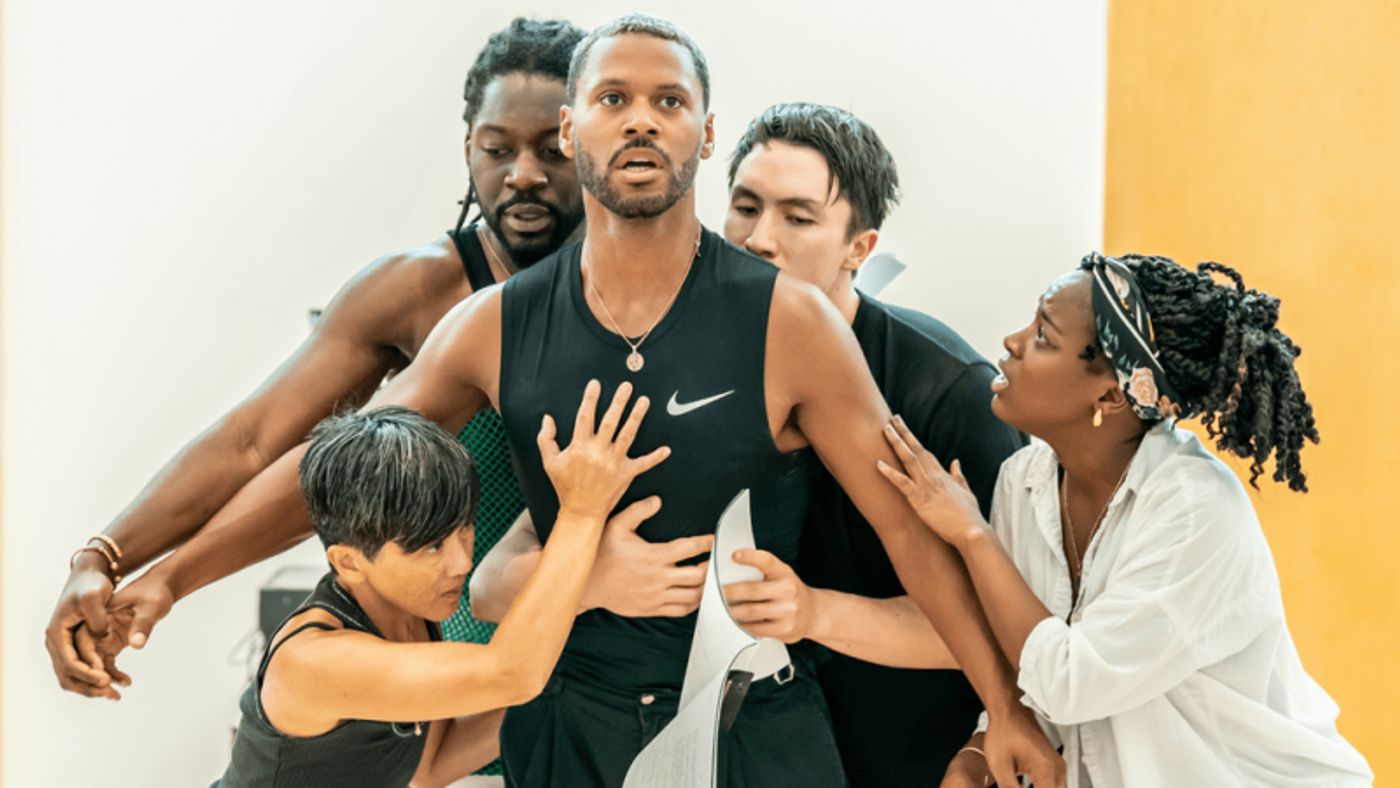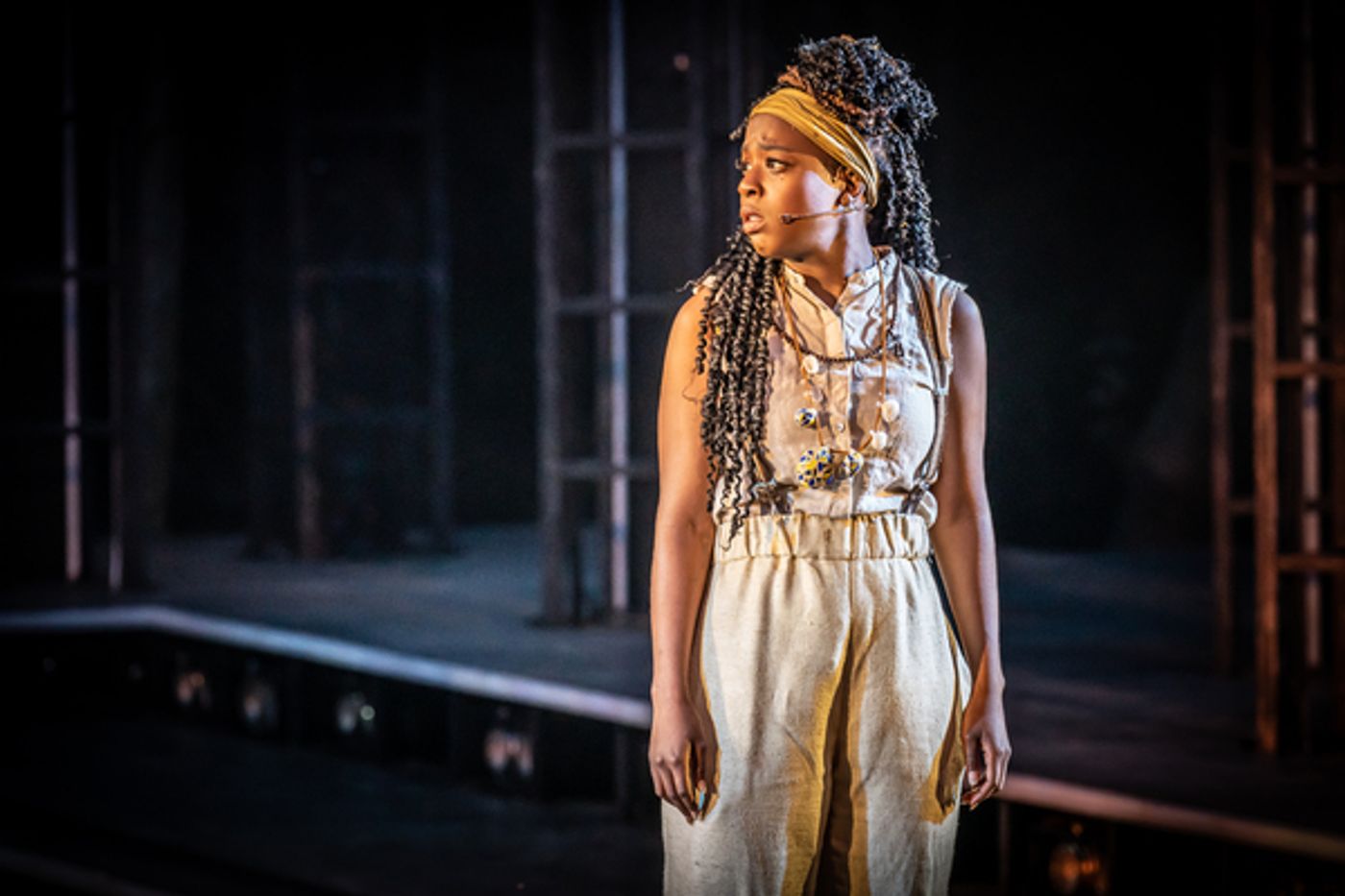Interview: 'We're Complicit in This World of Capitalism': Actor Gabrielle Brooks on Multi-Roling, Gender Stereotypes and the Powerful Message of MLIMA'S TALE
'We’re telling the story of the tragedy of humankind when we don't learn from our mistakes'

“If you not give elephant proper burial he’ll haunt you forever.” Lynne Nottage’s newest work, Mlima’s Tale, tells the story of the ghost of one of the last “Great Tuskers,” elephants known for their long tusks, who was murdered so his tusks could become part of the ivory trade. Mlima haunts a range of people as they all represent some form of complicity within the trade, being consumed by capitalism and greed.
Gabrielle Brooks, along with other roles, plays Githinji, the Chief of Police. BroadwayWorld discussed with Gabrielle what it is like to be playing multiple roles with a small ensemble, what she hopes audiences take away from the show, and what she has learned during her time researching for the role.
So how did you become involved with Mlima’s Tale?
I was speaking to my agent about doing more plays. I haven't done a play for a couple of years since we’ve come back from Covid. I said, “I really want to play, I really want to do the right play.” And we also had a discussion about some directors that I'd like to work with. And Miranda [Cromwell], who is directing Mlima’s Tale, was on that list, actually! So when this audition came up, I read the script and went, “Amazing!” I love Lynn Nottage, I’m a big fan! I'd seen a play that she did many years ago at the Donmar and it knocked my little socks off. I was in the middle of doing another show at the time at Regent's Park, and it was taking up a lot of my time, but I was like, “I must get the show!” Came in to meet Miranda, did a few accents for her, did quite a few of the scenes for her, and then got a lovely call to say that I got the job!
So you'd been a fan of Lynn Nottage before joining the play?
Yeah! I think her work is really varied, but focuses a lot on one thing, but a lot of her work centres around empathy. And people from different walks of life being able to hone in on a very specific experience, not because they've had the same experience, but because they can relate to it somehow. I just love that about her. Her work feels so varied, but it feels like it has so much heart.

Can you tell us a little more about Mlima’s Tale?
So Mlima’s Tale is set primarily in two countries, Kenya and Vietnam, and it tells the story of a beautiful elephant called Mlima, who is one of the last “Big Tuskers” in Kenya. You follow Malema as he haunts all of the people who are essentially to blame and complicit in his demise. That's not a spoiler! You find out very early on the show. I'm not spoiling it, I promise!
He does have a terrible, terrible ending. But the telling of the story is quite beautiful. And the elephant element is not very literal. Yes, we are telling the story of an elephant. But one thing I would say to anyone who would like to come is, I wouldn't get stuck on the visual representation of an elephant. We’re telling the story of the tragedy of humankind when we don't learn from our mistakes, when we get obsessed by capitalism and how we value material because we've been told for so long to value something.
What role does your character, Githinji, play in Mlima’s Tale?
I actually play quite a few characters in the show! A big element of the show is multi-rolling, and it was one of the things that drew me to the show. Quite a few times in the show, I get to play a man. I say “get” to play a man because the way men tend to be written and the way they get to present themselves in the world, they often have more autonomy than women. They just do. So to be able to play that feels quite powerful and revolutionary. There is something very poignant about the words that a man would usually say in society coming out of the vessel of me, a woman, especially a black woman. One of my characters is the Chief of Police. Which is great, I just love being able to have that much power! But if I said the themes that Githinji, the Chief of Police character, represents, it would be corruption of power, which I think is something that we've all been witness to. Without getting terribly political, I think it's very relevant.

One of my other characters is more like a wheeler-dealer character, what happens to that middleman in society when greed is his driving force. Capitalism tells you you have to keep reaching for more, but there's always collateral damage. You are not the only person that is subject to the downfall of that. We are, as an ensemble, working very, very hard to tell this story. I can't remember how many characters there are! But there are four of us multi-roling, and 10-plus characters.
What is it like to be multi-roling? How do you prepare yourself for that?
It's an amazing challenge. I love the variety every day. But there are logistical elements of it that are really challenging, like changing accents. We're from all over the world. I can't tell you how many accents there are! There's Chinese, there's Kenyan, there's Nigerian... At some point, I play a very middle-class, RP saleswoman. We're very lucky because we have Hazel Holder, our dialect coach on this, who has been giving us separate sessions to help us draw these characters and find ways to slot in and out of them. And we have a fantastic movement coach, Shelley Maxwell, who is very supportive in helping, especially the women, take on the physicality of a man. If I speak specifically to gender stereotypes, we tend to hold ourselves very differently. Men take up space, generally, in a way that is very different to women. So it's also taught me a lot about myself. I didn't realise how much I tend to look down when I'm having conversations. And then when I was doing research on a Chief of Police at a press conference, they're so direct, so much more direct! I think I take up less space. I only use that space when I think I need to. It's fascinating. I really enjoy it. But it is terrifying! [Laughs]
Did you do much research in preparing for the roles?
Yeah! I'm a little bit obsessive on YouTube!
There's one particular character that I'm basing my character on - I'm putting quite a lot of what I assume his personality to be. He takes up a lot of space, and I don't think leaves much room for empathy. So I'm just watching a lot of videos on men who do similar jobs in similar parts of the world. And then I hone in on one person who I can find multiple videos of. Also, Lynn Nottage, the writer, did a lot of research into the ivory trade because that's what the show is essentially about. A lot of her base materials, she talks about in interviews, and she's also shared with us. So it's been wonderful to learn more about the history of the show and where it came from for her, through her source materials. It's brilliant. I'm a bit of a history nerd! [Laughs] The last show that I did was set in Haiti, and now I feel like I could do a pop quiz on Haiti! I geeked out so much learning about the place where the play I was doing was set. It's one of my favourite things, to delve into the history and geography of the show that I'm doing.
Is there any interesting fact you've learned in research?
Oh, yes! So many years ago, I think it was 2016, the laws on the ivory trade changed drastically so that it became illegal. But, you can trade already existing ivory. So the reason why the illegal ivory trade is so prevalent is because the lines keep getting so blurred. It's hard to prove what is from a recently dead elephant and what is from an elephant that died pre-2016. Also, heartbreakingly, there's been research done into how soon these animals will be extinct if we continue with the ivory trade in the way that we do.
There's a lot that I've learned about it. It's hard as well because you wonder if there's something that you can specifically be doing. I know that I'm the sort of person I’ll watch a play and think, “This must be a call to action! I must do something!” But I also think that knowledge is power. And I think the spreading of knowledge is very, very powerful. So I continue to learn about it and share it because it's integral that we understand how much we're complicit. If you don't buy ivory, great for you, but there are other things that we put on pedestals that are hurting not only animals but other human beings. We're all complicit in that. And I include myself. But like I said, I think the spreading of knowledge is power. So it's good to learn about. Our show is absolutely stunning. It’s gorgeously beautiful, but a lot of it is heartbreaking. But I hope that the audience gets a lot from it. There's a lot to learn.
What has it been like working with the Kiln Theatre?
Oh, I love working here! I absolutely love the Kiln Theatre so much. It's such a beautiful energy and vibe. These smaller, subsidised theatres, there's so much passion here. People are doing it for the art, but they're also doing it for their community. It's been a long time since I've worked in a building where I felt like I knew everyone's face, and they knew mine, and they made an effort to say hello to me every morning. And people genuinely really enjoy coming to work here! They're really invested in the show that’s happening in their theatre at the time. People in the greenroom will ask me how rehearsals are and it feels like such a genuine question. I feel that way about the theatre I just worked in recently, Regent's Park. There's a real family feel there and they really care about the art that's being made. It's lovely. I would work at the Kiln over and over again. And I've wanted to work here for a very long time, actually, because I love a lot of plays that they put on. So very happy to be at the Kiln!

at Regent's Park Open Air Theatre
What has it been like going from musicals to plays?
I always find it so interesting when people ask me that because the thing where I feel most settled is being in plays. I didn’t train in musical theatre, musicals just happened in my life. Which is amazing! I feel very, very lucky.
There are worse things that could just happen, right?
Right? There are worse things that can happen. I feel very, very blessed. But also, it's been my dream to have this variety. It's less of a toll on my voice. To sustain yourself in a musical is a massive task. It really, really is. When I'm in a play, I take care of myself differently. I'm still taking care of myself, I just have to take care of my voice very differently when I'm in a musical or when I'm in a play. When I first came back from Covid, I got to do this beautiful play. I loved it. I love having more to say. Singing is wonderful and I absolutely love it, but I feel like I'm coming back to somewhere I'm more familiar with when I come back to plays. So I always feel very, very lucky. It's wonderful.
What do you hope audiences take away from Mlima’s Tale?
I'm gonna preface this by saying I don't want anyone to leave the show feeling deep guilt or trauma from it. But I do think it's important to understand how much we are complicit in this world of capitalism. You might not have single-handedly created it, of course you didn't. But we are all part of this machine, and we're all feeding it. When we talk about the ivory trade and tusks, what I want people to realise is that this man-made trade doesn't even need to exist. This harm, this damage that's being done to these animals, doesn't need to exist. If you're not an animal person, I hope you become one. I really do! And I hope that you understand that this is a global issue. It's not just an issue that exists far away from us. If you think that you're not complicit, we all are. And there's a lot that we could do to change the world. We just need to tweak our idea of value. I think and I hope it will happen. But I'm an optimist.
And how would you describe Mlima’s Tale in one word?
Mesmerising. There's so much to take in with the text, but visually, we've created a show that’s quite mesmerising. I'm mesmerised when I watch my fellow castmates, so I hope everyone else feels that way.
Mlima’s Tale runs at the Kiln Theatre until 21 October.
Photo Credits: Marc Brenner

Videos

